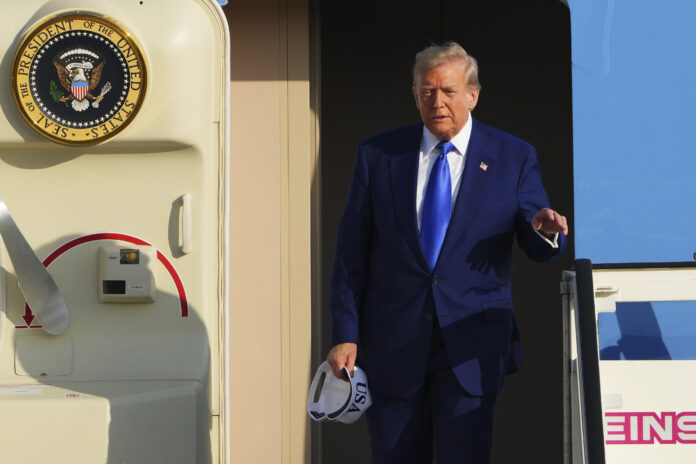Key Point Summary – Trump Between Bombs and Peace Deals
- Trump halted the Iran-Israel war after 12 days
- Ordered B-2 bombers to strike Iranian nuclear sites
- Republican lawmaker nominated him for the Nobel Peace Prize
- Trump demanded firm U.S. leadership in global conflicts
- He questioned NATO’s mutual defense clause
- Lost his temper after ceasefire violations
- Previously deescalated India-Pakistan tensions during first term
Bombs, Bunker Busters—Then Suddenly Peace
Donald Trump just pulled off one of the most dramatic turnarounds of his presidency.
After ordering a major airstrike on Iranian nuclear centers, the president brokered a ceasefire between bitter rivals Israel and Iran. The move stunned both allies and critics—turning Trump from aggressor to peacemaker in less than 72 hours.
This wasn’t fiction. It was a geopolitical thriller—with Trump starring in every scene.
And now, his name is being floated for the Nobel Peace Prize.
Donald Trump Between Bombs and Peace Deals
Republican Congressman Buddy Carter wasted no time. As the 12-day war ended, he sent a formal nomination for the Nobel Peace Prize to Oslo. His reason? Trump “saved the world from a Middle East explosion.”
The dramatic pivot marks the first major international success of Trump’s second term. After struggling to end the war in Ukraine, he found his opening in the volatile Middle East.
His method? Show power. Then offer peace.
Stealth Bombers, Deep Strikes, and Trump’s Tactics
When Israel struck Iranian positions, Trump didn’t hesitate.
Seven B-2 stealth bombers took off, armed with 14 bunker-busting bombs. Their mission: target Iranian nuclear infrastructure with surgical precision.
The message was loud and clear—America was back, and it meant business.
But then, unexpectedly, Trump changed tone. After Iran launched what officials called a symbolic response, Trump shrugged. “At least they got it out of their system,” he said.
Then came the real twist—an American-brokered ceasefire deal.
Peace With a Profanity
Trump got both sides to agree on a phased ceasefire. Iran first, then Israel twelve hours later.
But it wasn’t smooth sailing. When violations occurred within hours of the agreement, Trump reportedly exploded behind closed doors—dropping a profanity-laced tirade aimed at both Tehran and Tel Aviv.
It worked. The fighting stopped. The ceasefire held.
But it left no doubt—Trump’s version of diplomacy comes with a very sharp edge.
Applause from the GOP
“Real leadership,” said House Speaker Mike Johnson. Senator Tim Scott praised Trump’s “textbook example of American strength.”
Even Trump’s usual critics within the Republican Party were forced to admit—this was a big win.
Conservative media lauded the moment as “Trump’s Middle East triumph.” And in a week filled with courtroom drama and campaign chaos, Trump reclaimed the foreign policy spotlight.
NATO: Help for Friends, Not Freeloaders
While the world applauded the ceasefire, Trump dropped another bombshell—this time verbal.
Speaking en route to the NATO summit in The Hague, he said he may not honor Article 5—the alliance’s core mutual defense clause.
“I’ll help friends,” Trump said. But he didn’t define who qualified as a “friend.”
The vague statement rattled European allies and sparked fresh fears that Trump could unravel the post-WWII security order.
But his supporters saw it as another example of tough love diplomacy.
The Global Role Trump Loves
There’s no denying it—Trump relishes being the center of world affairs.
Whether dropping bombs or negotiating peace, he thrives on the attention, the urgency, and the spectacle.
But that comes with volatility. Insiders say Trump’s temper flared repeatedly during ceasefire talks. He reportedly threatened to cut off aid, block flights, or even expose secrets to force compliance.
It worked. But at a cost.
Looking Back—and Ahead
This isn’t the first time Trump has stepped into global conflict.
During his first term, he was credited with helping defuse a tense nuclear standoff between India and Pakistan. Now, with the Iran-Israel ceasefire, he’s added another chapter to his unpredictable foreign policy legacy.
Whether this earns him a Nobel Prize remains to be seen. But one thing is clear—Trump is back in his favorite position: commanding the world stage.
And he’s not whispering. He’s shouting.




